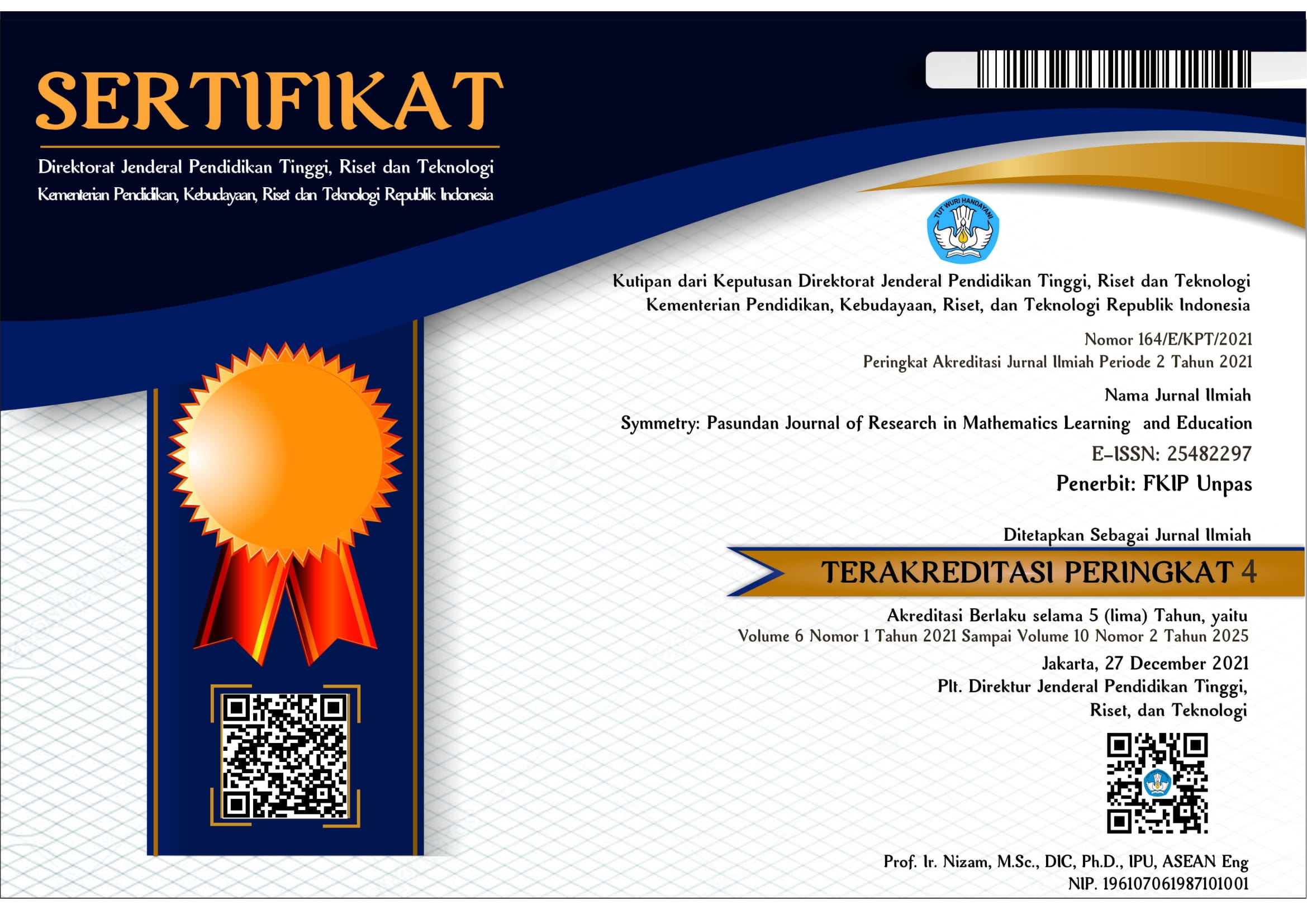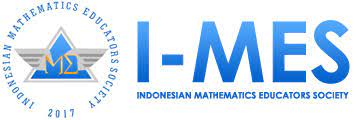MATHEMATICAL CONTENT KNOWLEDGE CALON GURU MATEMATIKA BERDASARKAN DIMENSI PENGETAHUAN TAKSONOMI BLOOM REVISI
DOI:
https://doi.org/10.23969/symmetry.v10i1.28268Abstract
Teachers play a central role in determining the success of the educational process, especially in mathematics learning, which requires a deep understanding of the subject matter. A professional mathematics teacher is expected to possess adequate Mathematical Content Knowledge (MCK) to deliver the material effectively. Therefore, prospective teachers need to be equipped not only with pedagogical skills but also with strong content mastery. This level of knowledge can be analyzed through the dimensions of the Revised Bloom’s Taxonomy, which includes factual, conceptual, procedural, and metacognitive knowledge. This study aims to identify the Mathematical Content Knowledge abilities of prospective mathematics teachers based on the Revised Bloom’s Taxonomy. The research used a quantitative method. The population consisted of seventh-semester students in the Mathematics Education (Tadris Matematika) Program at the Faculty of Tarbiyah and Teacher Training, IAIN Syekh Nurjati Cirebon. A total of 44 students were selected using cluster random sampling. Data collection techniques included non-test (questionnaire/self-report) and test (written questions). Data analysis involved data presentation, normality testing, and difference testing.The results showed that the Mathematical Content Knowledge of prospective mathematics teachers based on the knowledge dimensions of the Revised Bloom’s Taxonomy was consistent between test results and questionnaires. The highest level of MCK was found in the procedural knowledge dimension with a percentage of 27.12% based on the test results. There were no significant differences between male and female participants.
Keywords: Mathematical Content Knowledge, Prospective Teachers, Revised Bloom’s Taxonomy
Downloads
References
Achi Rinaldi, Novalia, dan M. S. (2020). Statistika Inferensial untuk Ilmu Sosial dan Pendidikan. Bogor: IPB Press.
Arifa, F.N., & Prayitno, U.S, (2019) “Peningkatan Kualitas Pendidikan : Program Pendidikan Profesi Guru Prajabatan dalam Pemenuhan Kebutuhan Guru Profesional di Indonesia,” Aspirasi: Jurnal Masalah - Masalah Sosial, vol. 1, p. 10.
D. Supriyadi,(2003) Pendidikan, Pelatihan dan Perjuangannya Sejak Zaman Kolonial hingga era Reformasi, Jakarta: Depdiknas.
Dwi Oktaviani & Iwit Prihatin. (2018). Analisis Hasil Belajar Siswa Pada Materi Perbandingan Berdasarkan Ranah Kognitif Revisi Taksonomi Bloom. Jurnal Ilmiah Matematika dan Pendidikan Matematika, 81-88.
Emerick, S., Hirsch, E., & Berry, B. (2003). Unfulfilled Promise: Ensuring High Quality Teachers for Our Nation’s Students. Teaching Quality Institute. Retrieved from http://www.teachingquality.org
H. Hudoyo, (1985) Teori Belajar dalam Proses Belajar Mengajar Matematika, Jakarta: Depdikbud.
Hermawan, V., & Anggiana, A. D. (2019). Pengaruh penerapan Quantum Teaching terhadap peningkatan kemampuan penalaran matematika pada mahasiswa calon guru. Symmetry: Pasundan Journal of Research in Mathematics Learning and Education, 4(2), 79–85.
Kemendikbud, “Data hasil UKG 2017,” 2017. [Online]. Available: https://npd.kemendikbud.go.id.
Kemendikbud, “Hasil PISA Indonesia 2018,” 2019. [Online]. Available: https://www.kemendikbud.go.id.
Krisnamurti, C.N., Sulistyani, N., & Febriyanto, F.,(2020) “Kemampuan Calon Guru Dalam Menginterpretasi Materi Koordinat Kartesian.,” UNION : Jurnal Pendidikan Matematika, vol. 8, no. 1, pp. 147-153,
Mulyasa, E. (2012). Standar Kompetensi Dan Sertifikasi Guru. Bandung: PT. Rosda.
Nafiati, D. A. (2021). Revisi taksonomi Bloom: Kognitif, afektif, dan psikomotorik. Humanika: Kajian Ilmiah Mata Kuliah Umum, 21(2), 151–172.
O. Syarif (2017), Kemendikbud Berkomitmen Tuntaskan Sertifikasi, Jakarta: Media Indonesia,
Purwoko, A. (2017). Profesionalisme guru: Konsep dan aplikasi dalam pendidikan. Yogyakarta: Pustaka Pelajar.
Salwah, Ashari, N. W., & A, F.,(2020) “Professional Competence: Mathematics Content Knowledge Mahasiswa Calon Guru Pada Mata Kuliah Analisis Kurikulum Matematika,” ROXIMAL: Jurnal Penelitian Matematika dan Pendidikan Matematika, vol. 6, no. 1, pp. 54-61,
Sugiyono. (2013). Metode Penelitian Kuantitatif, Kualitatif dan R&D. Bandung: Alfabeta. Sudarman, D. (2010). Profesionalisasi dan Etika Profesi Guru. Bandung: Alfabeta.
Sudjana. (2005). Metoda Statistika (Edisi ke 6). Bandung: Tarsito.
Salwah, Ashari, N. W., & A, F., “Professional Competence: Mathematics Content Knowledge Mahasiswa Calon Guru Pada Mata Kuliah Analisis Kurikulum Matematika,” ROXIMAL: Jurnal Penelitian Matematika dan Pendidikan Matematika, vol. 6, no. 1, pp. 54-61, 2020.
V. Meutia dan R. A. Mursita,(2018) “Kompetensi pedagogik Guru Kelas dalam Pembelajaran Peserta Didik Tunarungu,” Jurnal Pendidikan Anak Usia Dini, pp. 19-27.
Yang, X., Kaiser, G., König, J., & Blömeke, S. (2021). Relationship Between Chinese Mathematics Teachers’ Knowledge and Their Professional Noticing. International Journal of Science and Mathematics Education, 19(4), 815–837. https://doi.org/10.1007/s10763-020-10089-3
Downloads
Published
Issue
Section
License
Copyright (c) 2025 Symmetry: Pasundan Journal of Research in Mathematics Learning and Education

This work is licensed under a Creative Commons Attribution 4.0 International License.
Hak Cipta sepenuhnya ditangan jurnal.



















